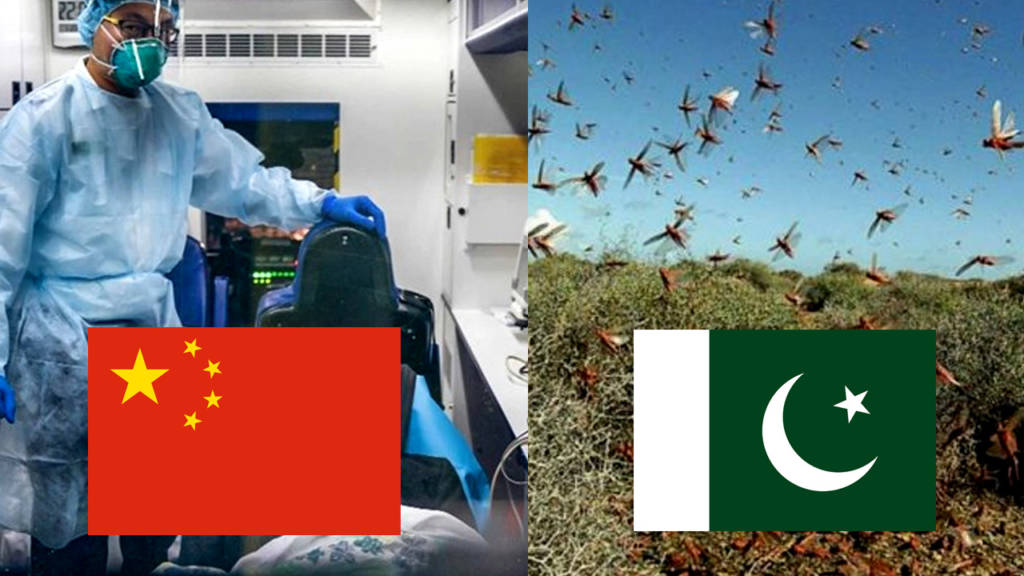The world is on high alert as the deadly Coronavirus continues to spread unabated. India has dealt swiftly with the virus by evacuating its citizens from Wuhan, China by two Air India special flights. India is also currently battling the influx of locusts from Pakistan with the latter having declared national emergency over the recent locust attacks.
Indeed, at this point, India dealing on two fronts with its problematic neighbours: a locust invasion from Pakistan, and a Coronavirus outbreak from China.
It seems that Chinese food menus are to blame for the spread of Coronavirus as various experts believe that the virus was originated from the bats which were subsequently consumed by the Chinese as pictures of Chinese consuming bat soup at a local restaurant quickly went viral. However, the original source of the virus is still not known and many theories have found takers in this time of confusion. All that is known is that the airborne, zoonotic disease is highly contagious and has taken the densely populated cities of China by storm, starting with Wuhan. While India has successfully evacuated hundreds of Indian citizens from affected and quarantined areas, more than two cases have already been confirmed in India.
While India has reported only two cases of coronavirus till date, the threat remains very high due to India’s proximity with China. Many countries have acted against China and have subsequently issued travel advisories or in the case of Indonesia, have sent back a flight from China after a passenger showed symptoms of coronavirus.
While India has successfully evacuated its citizens from Wuhan, Pakistan on the other hand, has refused to evacuate its citizens so as to “stand in solidarity” with its all-weather ally China.
Pakistan is also undergoing a turmoil as it battles one of the deadliest locust attacks in decades and has declared national emergency to tackle the insects destroying crops on a large scale in Punjab province, country’s main region for agricultural production.
The cash-strapped Pakistan government has also approved a sum of Rs 7.3 billion to overcome the locust crisis. As a result, India is now also battling locust attacks as the swarms of locust are currently crossing the Pakistan-India border along Cholistan, the minister said, adding that insects had entered Cholistan and Nara from Sindh and Balochistan.
According to the Indian Express, 12 Rajasthan districts are facing one of the worst locust attacks in 26 years. The most recent outbreak was reported in 1993 when the state’s Agriculture Department had carried out preventive measures on 3,10,482 lakh hectares affected land. GR Matoria, deputy director agriculture (DDA), Sri Ganganagar, said, “We have so far conducted spraying of pesticides in 20,000 hectares in the district. A total of 25 villages have been covered since January 7 when the swarms started coming in large numbers from Pakistan side.” Matoria said that the spraying operations are taken up mostly from 6 AM to 12 PM and from 6 PM till 8 PM. “During the day time, the swarm moves with sunlight and hence pesticide spray during those hours is not as effective. In villages 8V and 23H, the farmers had put to fire grass near the fields as locusts get distracted by the fumes,” he said. Dr Rajpal Jhajhria, assistant director, agriculture, Karanpur said they have been carrying out operations since first week of January. “We carried out big operations in villages 24H, 47F, 54F and 12F killing over 25,00,000 locusts through sprays,” Jhajhria said, but warned that locust population is likely to increase in March, which is their breeding season. “We are trying our best to not let that happen as swarms from Sri Ganganagar move towards Punjab, which is an agrarian state. Already locusts have been spotted in border districts of Punjab,” Jhajhria added.
While Coronavirus poses a risk of a public health emergency, the locus attacks can destroy food crops in parts of Western India which can have devastating effects on the financial state of farmers and the economy. India seems to be dealing proactively and effectively with the problems which have originated in China and Pakistan.
